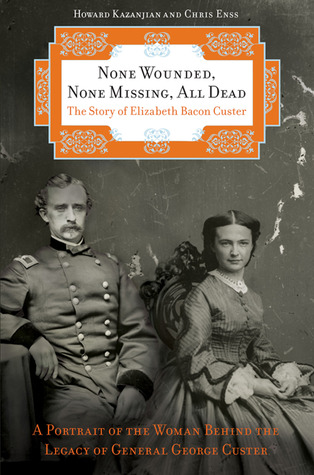I received this book from GoodReads in exchange for an honest review. (Thank you!) It's not often that I really struggle to get through a book, but this one was one of those times. This book is about the life of Elizabeth Bacon Custer and her marriage to General George Custer. It is a short read and the author's research is well-documented. (In fact, about 1/3 of the book is a the citations of the research, which is okay with me since I would totally read that closely if I wanted to do more investigating.) There are 10 chapters in this book and I thought I would read a chapter a day. I found that I struggled with that. I was bothered that I couldn't figure out why this book was so hard for me. Here are a few of my thoughts:
1) I was not as interested in the subject as I thought I might be. I did learn a few things from this book and I was able to see the life of George Custer from some perspectives that I hadn't known about before, but there was nothing that made me curious as to what would come next for the couple.
2) (Hold on to your hats for this one) The book often quotes letters and journals, but I think that was distracting to me. It would be talking specifically about Elizabeth and then mention what was going on with her husband and then include a letter about her husband or relating to another thing and I just felt that the transitions were strange? Maybe the writing style of the author just doesn't appeal to me. There was also a lot about 2 other men, who were important in the lives of the Custers but I either wanted them mentioned in the book, or wanted more information about their background too.
3) George took such and such position- Elizabeth went with him. Then George had to move here. Elizabeth didn't. Repeat. A lot.
4) I think the real reason I didn't enjoy the book is that I didn't get emotionally attached to either Custer. I know it is not the authors intention in a non-fiction work to convince a reader to like or dislike a main character and it is their intention to portray them as they actually were, but sometimes I felt that the author was a bit biased. (Sometimes I felt he liked the Custers and other times, not so much.)
If anything related to this book is interesting to you- life on the plains, military history, Native American relations in the West, etc- perhaps this book might be a good read, but I found it dry.
Reading Challenges Stats:
Goodreads Challenge: 15/75 (2 behind schedule)
Monthly Keyword Challenge: 5/12 (on track)
Mount TBR 11/24- (Ahead of schedule)




